- Home
- Upton Sinclair
One Clear Call I
One Clear Call I Read online
EARLY BIRD BOOKS
FRESH EBOOK DEALS, DELIVERED DAILY
BE THE FIRST TO KNOW—
NEW DEALS HATCH EVERY DAY!
One Clear Call
A Lanny Budd Novel
Upton Sinclair
Sunset and evening star
And one clear call for me.
TENNYSON
BOOK ONE
Powers That Will Work for Thee
1
Who Will Go for Us?
I
The small catboat slapped the waves of the gulf, and the salt-laden spray flew over the man and the woman; they were clad only in bathing suits and smiles, and it was the same as an early morning swim. They leaned out to windward, to keep the boat level, and gazed over the blue water, glinting with sunshine. Here and there a small flying fish rose from the water in front of them, sailed along like a toy airplane, and then plunged into the sea. “Look!” Lanny would exclaim, and Laurel would be amused by his eagerness. Along the shore, lined with palm trees and small houses of white, blue, and coral pink, flew a procession of pelicans, gray birds which moved their wings with slow dignity and permitted nothing to disturb their course. Being early, it was pleasantly cool; later on the visitors from the north would seek shelter from a subtropic sun.
There is time to think while you sail, especially when someone else does the sailing and the course does not have to be changed often. Laurel Creston thought, What a lovely vacation! And then, I ought to be so happy! But there could not be a single note of joy in her symphony without its accompaniment of pain. She thought, He may have to go any day, and I may never see him again! Such was the fate of women in wartime; and in her heart she raged at the vile Nazi-Fascist creed that had caused millions of men to be torn from the women who loved them on all the five continents of the earth. Mothers, wives, and sweethearts everywhere had faced this war with anguish and then steeled their hearts to endure it.
She did not voice these thoughts to Lanny. To all appearances he was serene; he had lived through wars most of his life, world wars and civil wars all over Europe, and had adjusted his mind to them. He would go back to his job and be so wrapped up in it that he would have no time to grieve. But she would stay at home and think about him with heartache. She would cry, I must not love him too much! Some of my love must be given to mankind! But she found to her surprise that she was loving him more, and it was harder to give him to mankind.
Now and then she had expressed this thought to him and had found that, manlike, he took it merely as a compliment. She reflected that he had had two wives before her, and she could never be to him what her only man was to her. She wanted to ask him, Do you love me wholly? And will you always love me? But she had learned that men do not like these questions; that they want to take love as a matter of course, and not to pull up the plant by the roots to make sure that it is growing. The woman wants to be wooed over and over and studies arts to bring about that pleasant experience.
On the shore was a baby boy, and Laurel knew he was a bond between them; Lanny had a daughter some thirteen years old, but this was his first son. A man wants a man child to bear his name and carry on his work; to be and think like himself, and Laurel was enough in love to want it to be that way. She looked at the father—easy to see, in bathing trunks and a pair of sneakers. He showed few signs of his forty-three years, for he had taken care of himself. His face and neck and hands had been browned by the sun of Africa; he played tennis whenever he got a chance, and pounded the piano with vigor. Now he was happy as a boy, leaning backward over the side of a leaping sailboat. Laurel knew that he really was a boy in his thoughts, back in the Golfe Juan, where he had swam and fished and sailed from his earliest days. He had had a happy childhood, and Laurel was determined that if he did not have a happy manhood it would not be her fault.
Ashore there was a breeze off the gulf, and if you stayed in the shade it was endurable. Lanny still wore his trunks, and his wife wore a crepe slip. The baby wore nothing, unless you counted a mosquito netting which covered the basket in which he lay. He was restless, because there were a number of little red swellings on his skin, and they itched. The parents had developed the same trouble, and had thought it must be hives, due perhaps to the heat; but the people of this small fishing village told them that the trouble was caused by a tiny bug called a chigger which burrowed under the skin. Lanny had driven to Tampa to consult a doctor and had got a lotion which was supposed to help.
Now he was discussing the information he had gained; the chigger was a small red flea, and what it did was to bore a little hole and inject a drop of a digestive juice which was intended to prepare your flesh for its sucking apparatus. Usually its purpose was foiled because you knocked it off by your scratching—but that didn’t help you much, because the bit of your flesh went on being digested. The creatures climbed up the stalks of grass or weeds, waiting for you to brush against them, so it was better to wear leggings, and never to lie on the ground. Laurel listened to all this, and was amused to observe her husband’s interest in entomological details. She asked him why, and he said he was fascinated by the problem of what nature could have meant by creating so many strange forms of life, each struggling desperately to survive at the expense of others.
When the couple had exhausted this subject, they turned to the sponge industry of the Florida west coast: They had engaged a small powerboat which was to present itself at the two planks which served for a dock and take them out to the sponge beds. It was their plan to start at dawn and return before the worst of the heat, for early June was midsummer here. They were in love with the marvelous clear water, green in the shallows and blue in the deeps, in which you could watch innumerable strange forms, both animal and vegetable. Here was more material for speculation about Mother Nature and her reasons or lack of them. The world of men was at war, and that fact pained and grieved you; but here was a world that had been at war for millions of years, and no creature in it could have any sense of friendship for any other.
II
Their talk was interrupted by the arrival of a small boy. He was barefoot, and what he did about the chiggers was not clear; his clothing consisted of a pair of khaki shorts, all patches. He had wavy black hair, dark eyes, and skin the color of the pecan tree which grew beside his father’s house. For his two rows of pearly white teeth many a rich man or woman would have paid a fortune. He showed them when he smiled, and still more when Lanny gave him a small coin for his errand.
Now he said, “Telephone call for you, Mr. Budd.” Laurel caught her breath. She thought, Oh, God! But, being a well-disciplined lady, she made no sound.
Lanny replied, “Thank you, Toni,” and to his wife, “Excuse me, dear.” He got up and walked fast, the youngster trotting by his side. Along the unpaved road which served this little cove were scattered a few houses, and one of them was the café where Toni’s parents lived and labored. Both of them were large, and in the sunlight they shone with exudations of good living. America had treated them well, and their only trouble was that the land of their birth had got into a miserable war with the land of their adoption.
The café served a concoction called a gumbo, with crabs and shrimps and oysters and fish, peppers and onions and tomatoes and celery; a big bowl of it was a meal, and the three visitors from the north—husband and wife and the nurse who was the wife’s friend—had come every evening, to save the need of cooking in their rented cottage. Big Toni—Dantone was his name—was enraptured to meet a gentleman who had been raised on the French Riviera and had played with fisherboys who spoke the Ligurian dialect of Italian; he would stand and twist his handle-bar mustaches and gossip with Lanny all through the meal. Toni came from the Bay of Salerno, in the south, and took the same delight in
Lanny’s phrases that an inhabitant, say of Savannah, would have taken in the twang of Cape Cod. He seized the chance to learn in Italian, and safe from American ears—what this war was about. Was it true that the American Army was going into Sicily, and even to the mainland, and would Napoli and the other beautiful cities be entirely destroyed? They were being bombed now—you could hear it over the little radio which was kept going in the café, and the large and slouchy Signora Toni would stand listening, the tears gathering in her eyes. Ah, i poveri gente!
This agreeable gentleman from up north came striding quickly, and gave his name over the telephone, and all the Dantones, big and little, heard words which made them sad. Yes, he could come at once; he could leave in half an hour. He wouldn’t save much time by flying because he might be delayed in getting a plane. He had his family with him and would drive day and night; his wife would take a turn at the wheel. If all went well, he should reach Washington the next day, certainly by evening; he would send a wire in the morning to report what progress he was making. Yes, he had coupons for gasoline, and his tires were good. So long!
III
Lanny shook hands all round with his “dago” friends—he didn’t call them that, but others in the South did, and meant no harm by it; it was a name, like “Joe” for a soldier, and you grinned when you said it. Lanny promised to come back someday. Then he strode back to the cottage. Laurel wasn’t too shocked by the news; she had guessed long ago that her husband was doing some kind of secret work in a grim and terrible war, and that his duties took precedence over love and marriage. They threw their things into suitcases, and the other odds and ends into carton boxes, and stowed them in the trunk of the car. The baby, asleep, was laid on a pillow in his traveling basket; Agnes Drury, trained nurse and mother’s helper, would ride in the rear seat with him and keep watch. The cottage was locked up and the key left with the agent.
Northward along the coast, through the bay city of Tampa and beyond. By nightfall they were speeding across the peninsula of Florida, through seemingly endless forests of pine. The road was smoothly paved, and a mile a minute was standard—but you had to watch the shaft of light ahead, for a cow might wander out into the highway, and deer were plentiful, and would stand in the road, dazzled by the glare. Before midnight the car was speeding up the east coast, along which resorts were strung like beads on a thread. They had been through the usual cycle of boom and bust and then boom again, and now many of the great hotels were turned into military hospitals.
The travelers did not stop for meals but ate what they had in the car and bought more the next day. Lanny drove while the others slept, and when daylight came they were in the interior of Georgia, land of red clay and unpainted shacks. Two hounds, chasing a rabbit, dashed madly out of a pine wood, one of them directly under the wheels of the car. They did not stop; it was another casualty of war.
Laurel drove for a while, and her husband slid down in his seat and took a long nap. By midmorning they were in North Carolina, and he sent a telegram saying that he would reach Washington by dinnertime, and that two rooms should be reserved for him. That was necessary, for the city had become the capital of the world, and important businessmen were sleeping in chairs in hotel lobbies, in washrooms, taxicabs, and sometimes on park benches.
It was Highway Number One, all the way from Key West to the northern tip of Maine. They were coming into a district where war industries had been set up, and heavy trucks escorted them, behind and before. Lanny kept a space in front of him, so that if he were hit in the rear there would be room to slide. The highways of America had been transformed and would never again be the same; nothing in America would be the same, after this dreadful ordeal by battle. As they drove they listened to the radio, familiar voices of men whom they had never seen, telling them the events of the hour and explaining their import. The Japanese were being cleaned out of the Aleutians, and the Americans were holding on desperately at Guadalcanal in the Solomons; the Allies were bombing the island of Pantelleria in the Mediterranean, also various cities in the Ruhr; the Russians and Germans were sparring like two boxers, all along a two-thousand-mile line, and it was a problem which of them would begin the expected major onslaught. The airwaves echoed with Russian clamor for a second front and their refusal to accept the Mediterranean attack as an equivalent.
IV
The car came into Washington on schedule. Lanny had had another nap in the afternoon, and felt fine, he said. He telephoned Baker, the President’s man, and learned the name of his hotel. There was time for a bath and a shave, then to dress and have dinner—room service was prohibited in wartime, so Agnes had to stay with the baby and then dine by herself. Lanny said no word to his wife about where he was going or what he expected; he was under pledge and kept it strictly. But he couldn’t keep his wife from observing that these rush calls to Washington invariably preceded flights to Britain or North Africa and absences of several months.
Lanny sat and read the papers, with his watch on the table beside him. At ten minutes to nine he got up, put on his linen coat and his Panama hat, gave his beloved wife a more than dutiful kiss, and said, “Don’t wait up for me. I may be late.” He strolled out into the blacked-out city and, walking slowly and carefully, arrived at a certain corner promptly on the second of nine. A familiar car drew up at the curb, a voice said, “Hello,” and he stepped in.
He wasn’t supposed to talk to Baker either; but in the course of several years they had acquired a certain number of topics in common. Lanny said, “How is the Boss?” The answer was, “The doctors say he’s OK, but you don’t have to be a doctor to see that he’s tired.” Lanny said, “God help him!” And that wasn’t just a conventional phrase. The burdens which this great man carried in his soul, the problems he carried in his mind, were a cause of brooding sorrow to his secret agent.
1600 Pennsylvania Avenue was the address. It was a sort of little park, an oasis in downtown and crowded Washington. A high fence surrounded it, and Lanny was glad to see Navy men in little white caps patrolling. The Navy was in charge at the entrance drive, and the car stopped and Baker said, “A visitor on the President’s orders.” That was enough, and they went up the drive to what was called the “social door,” used only on formal occasions. Two secret service men stood in the shadow of the high columns, and now they came out and flashed torches; when they saw it was Baker, they stepped back. The pair went in, climbed a side stairway, and went down a corridor to the door of the President’s bedroom, where Prettyman, the Negro, sat on duty.
All this was routine to Lanny Budd; he had been here a dozen times in the same way. But his heart would never fail to beat faster, for he considered Franklin Roosevelt the greatest man in the world, and everything of a public nature that Lanny hoped for depended upon his decisions and commands. Lanny hadn’t enlisted in any of the war organizations, he wore no uniform and bore no title, but he had given his word, and keeping it was his supreme duty. The forty-three-year-old presidential agent had an earthly father, whom he loved, but there were limitations to his admiration for that father. In the past six years F.D.R. had come to be a sort of superfather. Lanny had never tried to formulate it, but if he had been asked to do so he would have called him a Father of the Future, a Father of Victory over Fascism.
V
Baker tapped on the door, and a cheery voice called, “Come in.” The crippled man lay on the ancient mahogany bed in which a long line of presidents had slept. Lanny had never seen him in any other position in this room: propped up by pillows, wearing a striped pongee pajama coat, his spectacles on, some papers in his lap and a stack of them on the table beside him. Always there was a hard day’s work behind him, a schedule of callers demanding decisions that would affect the fate of the world. In this room he could be quiet and comfortable; here he received a few of his trusted friends, and many times stole hours from his sleep for the pleasure of companionship which meant so much to him.
It was a hot night, and an electric fan was playi
ng on the bed, making it necessary to keep a book on top of the papers. The great man called a cheery greeting; when Lanny had come from China he had been “Marco Polo,” and now, browned by the sun of Florida, he was “Ponce de Leon.” He grinned and exchanged a warm handclasp, then sat in the chair beside the bed and studied the aspect of his Boss. A big man physically; a big head, and powerful arms and shoulders which he had developed of necessity, by untiring discipline. His hair had become entirely gray, and there was only a little of it left above the temples. The face was deeply lined, and Lanny’s heart ached to see it; but he must not give any sign, he must meet the cheery smile and the jest. Business as usual!
“Well, Governor, what’s up this time?” The P.A. knew that the hurried summons meant something special, and he thought it an act of kindness to take as little from the great man’s sleep as possible.
Roosevelt came directly to the point. “I had a man whom I especially trusted, and I sent him on an important mission to Italy. Yesterday morning I got word that his heart had given out, and they are shipping him home in a box.”
“Hard luck!” replied the other gravely. He hoped his own heart could be trusted.
“How well do you know Italy, Lanny?”
“I wouldn’t claim to be a specialist, but I’ve lived most of my life within an hour’s drive of the border, and I’ve visited a few times and motored over the whole country. On the Riviera people come and go, you know, and prior to the war the fashionable world didn’t pay much attention to national boundaries. I must have met hundreds of Italians off and on.”
“You speak the language?”
“Enough to get along. I wouldn’t be able to pose as a native.”

 Prince Hagen
Prince Hagen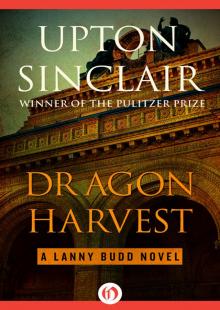 Dragon Harvest
Dragon Harvest The Jungle
The Jungle Sylvia's Marriage
Sylvia's Marriage Oil! A Novel by Upton Sinclair
Oil! A Novel by Upton Sinclair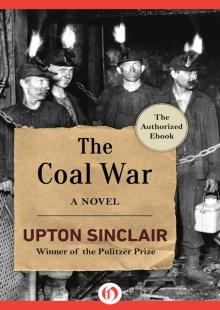 The Coal War: A Novel
The Coal War: A Novel Presidential Agent
Presidential Agent World's End
World's End The Second-Story Man
The Second-Story Man O Shepherd, Speak!
O Shepherd, Speak! Wide Is the Gate
Wide Is the Gate The Return of Lanny Budd
The Return of Lanny Budd One Clear Call I
One Clear Call I 100%: the Story of a Patriot
100%: the Story of a Patriot The Machine
The Machine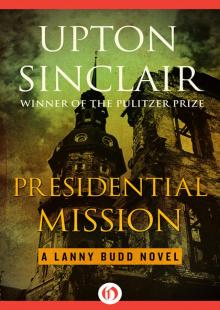 Presidential Mission
Presidential Mission A Cadet's Honor: Mark Mallory's Heroism
A Cadet's Honor: Mark Mallory's Heroism Between Two Worlds
Between Two Worlds World's End (The Lanny Budd Novels)
World's End (The Lanny Budd Novels) Between Two Worlds (The Lanny Budd Novels)
Between Two Worlds (The Lanny Budd Novels)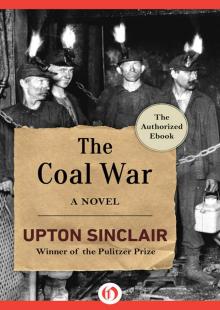 The Coal War
The Coal War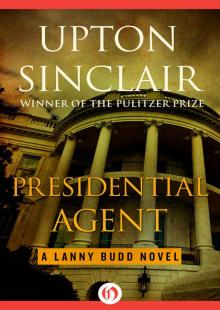 Presidential Agent (The Lanny Budd Novels)
Presidential Agent (The Lanny Budd Novels) Oil (filmed as There Will Be Blood)
Oil (filmed as There Will Be Blood) Wide Is the Gate (The Lanny Budd Novels)
Wide Is the Gate (The Lanny Budd Novels)